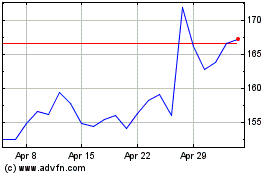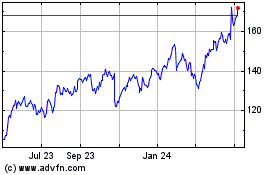Google CEO Sundar Pichai Faces Lawmakers Skeptical Over Privacy, Alleged Anti-Conservative Bias--2nd Update
December 11 2018 - 4:52PM
Dow Jones News
By John D. McKinnon and Douglas MacMillan
WASHINGTON -- Google Chief Executive Sundar Pichai deflected
questions about anti-conservative bias on the world's largest
search engine as he made a long-awaited first public appearance
before lawmakers who have grown increasingly skeptical of Silicon
Valley.
Appearing at a hearing before the House Judiciary Committee on
Tuesday, Mr. Pichai fielded tough questions about Google's
data-privacy practices and its handling of disinformation campaigns
by foreign actors. Much of the discussion, however, focused on what
Republicans see as efforts to suppress conservative voices across
the company's online services -- allegations that Mr. Pichai
repeatedly denied.
"We use a robust methodology to reflect what is being said about
any given topic at any given time," Mr. Pichai said. "I can assure
you we do it without regards to political ideology."
Republicans were doubtful, pointing to a range of recently
disclosed evidence, including videos and emails in which Google
executives express animosity toward right-leaning ideas and causes.
"For you to come in here and say there is no political bias in
Google tells us you either are being dishonest... or you don't have
a clue how politically biased Google is," said Rep. Louie Gohmert
(R., Texas).
The hearing highlighted the difficulty the Alphabet Inc. unit
faces in addressing the criticism that its search results and other
products reflect potential biases from its largely liberal
workforce. Google doesn't disclose many details about how its
algorithms determine search results out of concern those results
could be gamed or copied.
The questions echoed concerns raised by politicians in recent
months including President Trump, who in August accused Google of
elevating critical news stories about his presidency at the expense
of friendly conservative voices.
During the hearing, Mr. Pichai pointed out as proof of Google's
impartiality that its search engine frequently displays negative
news stories about its own company.
House Majority Leader Kevin McCarthy of California made it clear
in his opening statement at Tuesday's hearing that Republicans are
focused on what he termed a "widening gap of distrust" between
Silicon Valley and the American people.
That distrust was sometimes reflected in lawmaker's pointed
questions to Mr. Pichai about alleged bias, including claims that
the company pushed voting efforts only in certain states and that
it charges more money for ads of certain candidates than others.
The CEO said Google found no evidence of a targeted voting effort
and that its ad system is based on supply and demand, not political
bias.
Several Democrats sought to undermine Republicans' claims of
anti-conservative bias. Said Rep. Ted Lieu (D., Calif.) to GOP
lawmakers: "If you want positive search results, do positive
things."
Congress has discussed several possible steps toward regulating
tech giants including Google, ranging from data-privacy legislation
to an overhaul of Section 230 of the Communications Decency Act, a
landmark law that shields internet companies from liability for
hosting content produced by others. Both issues have attracted
support from Democrats as well as Republicans.
Several lawmakers raised concern about Google's handling of user
data, following the company's disclosure on Monday of a privacy bug
that exposed the personal data of 52.5 million users of the Google+
social network. That marked the second software glitch involving
Google+ user data this year, the first of which Google failed to
disclose for fear of regulatory scrutiny, The Wall Street Journal
reported in October.
"How can we be sure that personally identifiable information is
safe with you?" Rep. Hank Johnson (D., Ga.) asked.
Mr. Pichai said Google offers a privacy checkup tool to let
users adjust controls on how their data is collected, but said
Google has work to do to make it easier for users to fine-tune
these controls. Google, like several other tech companies, supports
federal privacy legislation as a way of mitigating the impact of
restrictive new state privacy laws such as California's.
Google faces criticism over its plans to develop a search engine
that would comply with China's strict internet censors. In the
hearing, Mr. Pichai dodged questions about the future of these
plans, repeatedly saying the company doesn't currently operate a
search engine in China and that he plans to be transparent about
any movement toward launching a product there. He acknowledged
there have been more than 100 employees working on products for the
Chinese market.
Mr. Pichai sought to reassure lawmakers of Google's identity as
an American company. "Even as we expand into new markets, we never
forget our American roots," Mr. Pichai said in his opening
statement.
He said over the past three years Google has made direct
contributions of $150 billion to the U.S. economy and added more
than 24,000 employees, many of them outside California, in places
such as Texas, Virginia, Oklahoma and Alabama. He also told
lawmakers that "we work hard to ensure the integrity of our
products," and that he leads the company "without political
bias."
Mr. Pichai at times played down the dominance of Google's market
power by saying users increasingly turn to Amazon.com Inc. and
other competitors for more of their searches.
Sitting behind him during the entire hearing was a man wearing a
mustache and top hat, dressed as the character from the popular
board game Monopoly.
Write to John D. McKinnon at john.mckinnon@wsj.com and Douglas
MacMillan at douglas.macmillan@wsj.com
(END) Dow Jones Newswires
December 11, 2018 16:37 ET (21:37 GMT)
Copyright (c) 2018 Dow Jones & Company, Inc.
Alphabet (NASDAQ:GOOGL)
Historical Stock Chart
From Mar 2024 to Apr 2024

Alphabet (NASDAQ:GOOGL)
Historical Stock Chart
From Apr 2023 to Apr 2024
